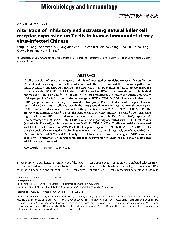摘要
T cell expression of NKRs can trigger or inhibit cell-mediated cytotoxicity. However, few studies on T lymphocyte NKR expression in HIV infection exist. Here, we examined the expression patterns of NKG2D, NKG2A, and KIR3DL1 on CD8(+) and CD3(+)CD8(-) cells by multicolor flow cytometry in groups of patients with HIV, AIDS or HAART-treated AIDS, as well as HIV-negative normal controls. Individual analysis of KIR3DL1 on CD3(+)CD8(+) or CD3(+)CD8(-) cells revealed no significant differences among any of the groups (P > 0.05). In contrast, the percentage of NKG2A(+)NKG2D(-)CD8(+) T cells was higher in the AIDS group than in the HIV-negative normal control group (P < 0.01). Meanwhile, the prevalence of NKG2D(+)NKG2A(-)CD8(+)T cells was lower in the AIDS group than in HIV-negative normal controls (P < 0.001). Similar results were also observed for the percentage of NKG2A(+)NKG2D(-) on CD3(+)CD8(-) cells. However, in contrast to CD8(+) T cells, the frequencies of NKG2D(+)NKG2A(-) on CD3(+)CD8(-) cells were higher in AIDS and HIV patients than in HIV-negative normal controls (P < 0.01, P < 0.05, respectively). The percentage of NKG2A(+)NKG2D(-)CD8(+) T cells was negatively correlated with CD4(+) T cell counts (r = -0.499, P < 0.01), while the percentage of NKG2D(+)NKG2A(-)CD8(+) T cells was positively correlated with CD4(+) T cell counts (r = 0.494, P < 0.01). The percentage of NKG2D(+)NKG2A(-)CD3(+)CD8(-) T cells was also positively correlated with viral load (r = 0.527, P < 0.01) and negatively correlated with CD4(+) T cell counts (r = -0.397, P < 0.05). Finally, HAART treatment reversed the changes in NKR expression caused by HIV infection. These results indicate that the expression of NKRs on T cells may be correlated with HIV disease progression.
- 出版日期2011-10
- 单位中国医科大学
